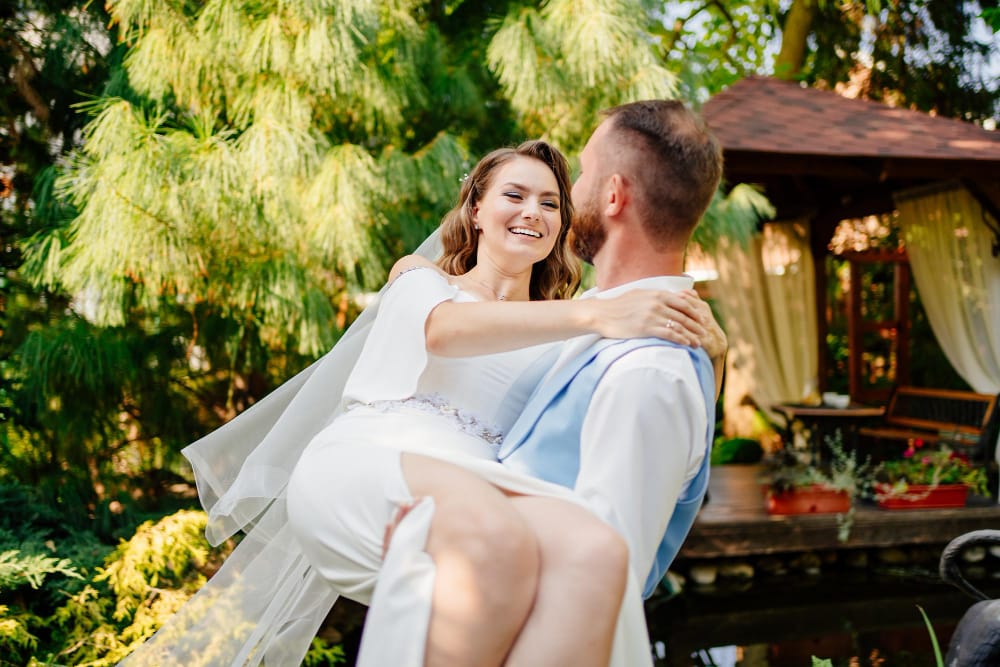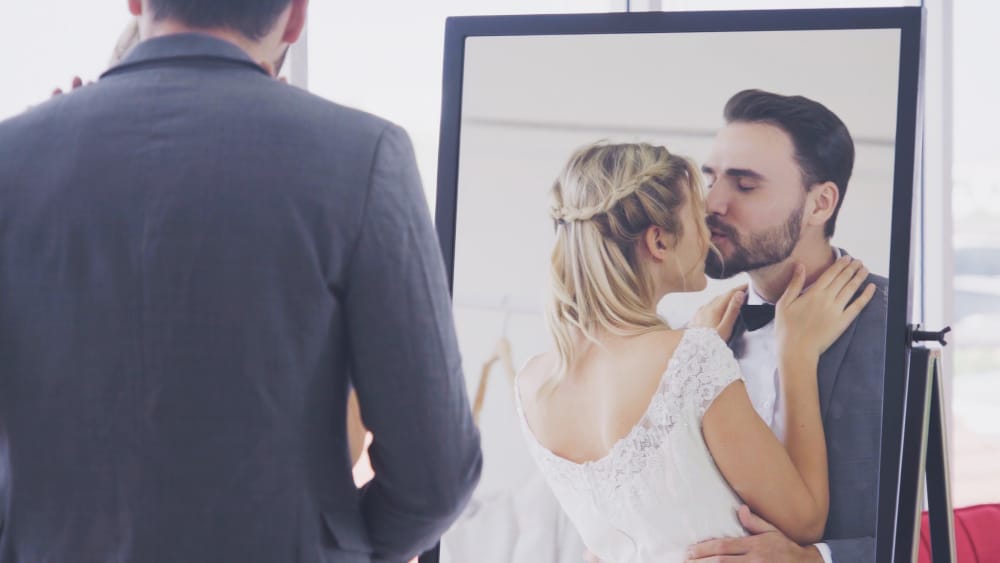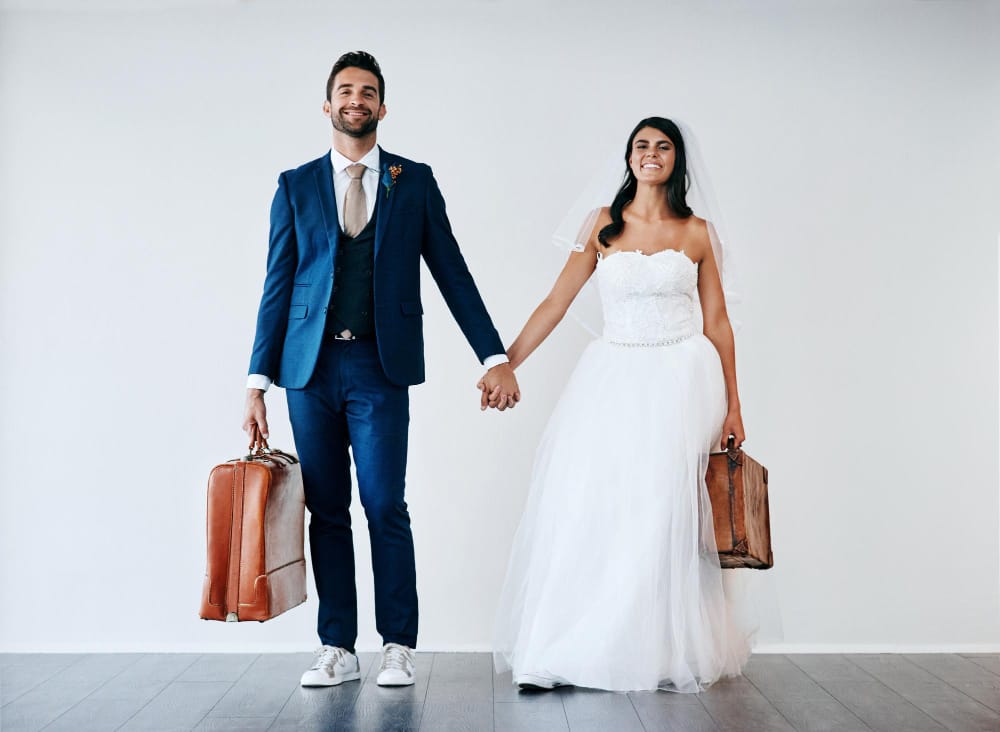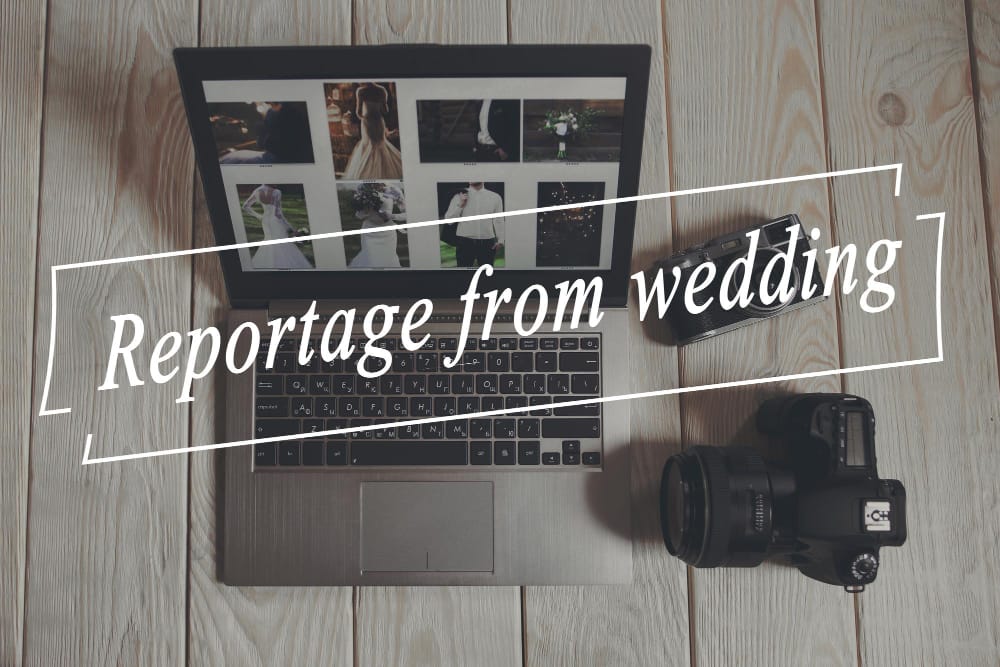
Weddings are emotional. They celebrate love, commitment, and the start of a new chapter.
This emotional aspect makes weddings a unique marketing landscape. It’s not just about selling a product or service. It’s about connecting with the emotions of the couple and their families.
This is where emotional triggers come into play.

Emotional triggers are psychological stimuli that influence our emotions. They can lead to increased engagement and sales, and they can be particularly powerful in the context of weddings.
Why? Because weddings are inherently emotional.
They’re about love, happiness, family, and tradition. They’re about creating memories that will last a lifetime. And these emotions can be leveraged to create powerful marketing campaigns.
But how do you effectively use emotional triggers in wedding marketing?
That’s what this article will explore. We’ll delve into the psychology behind emotional marketing. We’ll identify key emotional triggers for the wedding industry. We’ll also provide actionable insights on how to use these triggers to connect with potential clients.
Whether you’re a wedding planner, a wedding vendor, or a bridal shop owner, this article is for you. It’s for anyone involved in weddings looking to enhance their marketing efforts.
So, let’s dive in. Let’s explore the power of emotional triggers in wedding marketing.
And let’s learn how to create marketing campaigns that resonate with the hearts of couples everywhere.
Understanding emotional triggers is crucial for effective marketing in the wedding industry. Emotional triggers can drive decisions, inspire actions, and create lasting impressions.
But what exactly are emotional triggers?
They are elements or stimuli that evoke specific emotions, influencing how people feel, react, and engage. For wedding marketers, these triggers are tools to connect with the deep emotions tied to weddings.
The wedding industry presents a unique landscape. It’s not just about transactions; it’s about experiences, memories, and significant life moments. Emotions are already at the forefront, waiting to be tapped.
Key emotional triggers in weddings often revolve around themes like love and happiness. However, other powerful emotions are also involved.
Understanding these emotions is essential for marketers.
To effectively engage potential clients, marketers must craft campaigns that resonate emotionally. This involves a deep understanding of the target audience’s desires and values.
Authenticity is vital when using these triggers. Consumers can sense insincerity, which can turn them away. Building genuine relationships through authentic emotional engagement is key.
Emotional triggers, when used well, can also foster brand loyalty. They help create a connection that makes clients remember and return to a brand. This connection can transform a one-time client into a lifelong supporter.
In the following sections, we’ll explore the psychology behind emotional marketing and discuss why weddings are particularly ripe for emotional triggers.
Emotional marketing is grounded in understanding human behavior and psychology. It involves identifying which emotions drive consumer actions. By tapping into these, marketers create stronger connections with their audience.
Our brains are wired to respond to emotions before logic. When faced with choices, emotions often guide our decisions. Thus, emotional marketing appeals to consumers on a primal level.
For wedding marketers, this means focusing not just on the product or service but on the emotions it evokes. It’s about creating narratives that mirror the emotional journey clients are embarking on.
Emotionally-driven marketing messages tend to have higher engagement rates. They inspire action, whether purchasing, sharing a post, or attending an event.
By understanding emotional psychology, wedding marketers can create campaigns that attract attention and build lasting emotional connections with clients.

Weddings are inherently emotional. They’re celebrations of love, unity, and new beginnings, and as such, they provide fertile ground for emotional marketing.
Weddings are a hotspot for emotional triggers for various reasons. First, they are deeply personal, marking a significant life milestone for couples and their families.
Additionally, weddings are rich in traditions and customs. These elements have deep emotional roots and can be powerful triggers. Whether it’s a specific cultural tradition or a family ritual, these resonate deeply.
The anticipation and excitement leading up to a wedding amplify emotions. This heightened emotional state allows marketers to create compelling narratives. These stories can make couples envision themselves in those moments.
Moreover, weddings involve various stakeholders. There’s the couple, but also families and friends. Each brings their own emotions and expectations. Understanding these dynamics is key to effective marketing.
Businesses can create powerful marketing campaigns by tapping into the emotions surrounding weddings. These campaigns attract clients and deepen their emotional engagement with the brand.
Identifying emotional triggers is crucial in wedding marketing. It helps target the right emotions for each client.
Marketers must recognize the primary emotions that drive wedding decisions. Here are some key emotional triggers to consider:
Each of these has different implications. Used well, they create memorable campaigns that resonate.
For love and happiness, the core goal of weddings is to evoke joy. Marketers need to portray moments of connection and celebration. These are the emotions most sought after by couples.
Family and tradition have a different appeal. They touch on the deep-seated values of togetherness and legacy. Exclusivity, meanwhile, appeals to the desire for a unique celebration.
FOMO is about urgency. It creates a drive to act promptly, whether through limited offers or exclusive events. It pushes clients to decide quickly, fearing they might miss out.
In contrast, trust and security offer reassurance and address common wedding planning anxieties. Demonstrating reliability is key to building long-term relationships.
Understanding these triggers allows for personalized marketing approaches. This personalization leads to better client satisfaction and loyalty.
Love and happiness are at the heart of every wedding. They are universal emotions that resonate with everyone involved.
In wedding marketing, showcasing love can be about more than just romantic love. It encompasses the bond between family and friends, too. Capturing these moments in photos and videos is essential.
Happiness, on the other hand, is about celebration. It’s the joy that fills the air at every wedding. Campaigns that focus on these emotions feel lively and vibrant. They inspire couples to dream about their perfect day.
By centering marketing efforts around these core emotions, brands tap into the essence of what makes weddings unique. This approach resonates deeply, attracting clients who seek to capture and share this joy.

Family and tradition are powerful emotional triggers. They’re grounded in history and identity, and traditions, whether cultural or familial, offer a deep sense of belonging.
Exclusivity, by contrast, touches on the desire for uniqueness. It says, “This day is ours and unlike any other.” Marketing messages can emphasize bespoke or tailor-made services to highlight this.
For many, weddings are about uniting two families, honoring parents and elders, and continuing family traditions. Marketing that reflects these values resonates well with clients.
By balancing tradition with exclusivity, wedding businesses can appeal to a broad range of clients. This mix allows for a personalized experience that honors the past and the present.
FOMO is a powerful motivator. It drives people to act quickly to avoid loss. This can mean missing out on a dream venue or dress for weddings.
Limited-time offers, such as flash sales or exclusive previews, can create urgency in marketing.
Marketers can prompt quicker decision-making by instilling a sense of urgency, which compels clients to act before opportunities slip away.
In wedding planning, trust is paramount. The stakes are high, and clients must trust their vendors.
Social proof, like testimonials and reviews, reassures clients. It shows that others have had positive experiences.
Highlighting awards, media features, or client testimonials builds trust. It positions the brand as reliable and secure.
This focus on trust and security helps ease decision-making. Clients feel confident they’re making the right choice, ensuring peace of mind.
Storytelling is a vital tool in wedding marketing. It turns marketing messages into memorable experiences.
Effective storytelling is about connecting with emotions. It lets potential clients envision their own story with your brand.
A well-crafted story can transport clients. It allows them to imagine their special day with emotion and clarity.
There are several elements to successful storytelling in wedding marketing:
Stories can be portrayed in various formats. They might include narratives, testimonials, or visual content.
Using stories helps to showcase the brand’s personality. It strengthens the emotional connection with the audience.
The narrative should align with what clients seek in their wedding and evoke the dreams and aspirations they hold dear.
Effective storytelling turns your brand into a part of the wedding journey. It becomes a cherished memory rather than just a service.

Visual storytelling offers a powerful way to convey emotions. Photos and videos capture moments with striking clarity.
Images can convey feelings instantaneously. They evoke emotions like joy, love, and excitement effectively.
Videos add depth to the storytelling. They bring weddings to life with movement and sound, creating a more immersive experience.
Use high-quality visuals for wedding marketing. They give a glimpse into the atmosphere you can create for clients.
Showcasing previous weddings with these visuals tells a story. It lets potential clients imagine their day similarly.
These visuals are not just about aesthetics. They are about capturing raw emotions and significant moments.
Crafting compelling visual stories takes skill. They should be woven together to form a coherent narrative.
By doing so, you can deeply influence and engage potential clients. They start to see their vision through your lens.
Testimonials are a form of powerful storytelling. They offer genuine insights from those who have experienced your service.
User-generated content, such as client photos, brings authenticity. It shows real couples and their special moments.
These personal accounts build trust. They demonstrate satisfaction and positive experiences, easing client concerns.
Incorporating testimonials in your marketing can highlight uniqueness. They showcase diverse experiences and outcomes.
Moreover, user-generated content encourages a sense of community. It invites clients to join a shared story.
Featuring client stories and photos can inspire others. It creates a ripple effect of shared experiences and emotions.
Authenticity is essential here. Potential clients are looking for genuine connections, not fabricated stories.
By integrating these elements, your brand’s narrative becomes real and relatable. Clients will feel more inclined to trust and engage with you.
Personalization and customization are crucial in wedding marketing. These strategies ensure each client feels unique and valued.
Personalization helps in tailoring experiences. It focuses on the client’s tastes, preferences, and desires.
Customization goes beyond just names and addresses. It includes offering choices that reflect individual styles and dreams.
This approach can strengthen emotional bonds. It creates a service that feels crafted specifically for the client.
Offering bespoke services shows attention to detail. It assures clients that their event is in capable hands.
Incorporating personal elements into marketing can include examples like custom invites or preferred music playlists.
Personalization extends to communication, too. Sending tailored emails with relevant offers enhances the relationship.
Companies can foster loyalty by valuing each client as distinct. Happy clients often lead to referrals and positive word-of-mouth.
Eventually, these personalized experiences translate into memorable weddings. They are a testament to service that respects individuality.
Being authentic in customizing services is key. Clients appreciate when their unique traits are thoughtfully integrated.

Music is a powerful emotional trigger in marketing. It sets moods and evokes deep feelings instantly.
In wedding marketing, music can create an atmosphere. It enables couples to feel the romance or joy associated with their event.
Choosing the right tunes involves understanding client preferences. This ensures the music resonates with their vision.
Music isn’t the only sensory tool. Scents, textures, and even tastes can heighten emotional responses.
Using multiple senses in marketing immerses clients in a rich experience. It engages them beyond just visuals.
Integrating sensory elements requires finesse. They should seamlessly align with the brand’s image and the client’s desires.
Colors play a pivotal role in influencing emotions. They can evoke peace, excitement, luxury, or warmth.
For wedding marketing, color choices should align with the couple’s vision. They help in setting the desired tone for the event.
Colors can also reinforce the brand identity. They should be consistently used across marketing materials to strengthen recognition.
Visual aesthetics go hand-in-hand with color psychology. A cohesive look captures attention and communicates professionalism.
It’s about creating visual harmony that reflects brand values. This can inspire trust and appreciation from potential clients.
Aligning visuals with emotional triggers can captivate clients. It’s an art and science that, when done right, creates a lasting impact.
Building brand loyalty within the wedding industry relies heavily on emotional connections. Engaging clients on an emotional level fosters a lasting relationship with your brand.
These connections are forged through consistent, meaningful interactions. Every interaction should reinforce the values and experiences your brand promises.
Creating emotional bonds starts with understanding what clients value most. A deep dive into client desires can reveal insights into what will resonate.
Once these connections are in place, they enhance customer satisfaction and trust. Clients who feel emotionally connected are more likely to become repeat customers.
Emotional connections also encourage word-of-mouth referrals. Satisfied clients become advocates, sharing their positive experiences with peers.
Ultimately, these efforts result in a loyal client base. When clients emotionally invest in your brand, they become partners in your success.
Aligning brand values with client desires is essential. It ensures that your marketing strategies resonate with clients on a personal level.
Understanding client preferences requires attentive listening and responsive actions. This alignment creates authenticity in your brand’s messaging.
A business that mirrors the ideals of its clientele can earn trust and admiration. Clients value brands that genuinely share their vision and beliefs.
This harmony between brand values and client desires forms an unspoken bond. When clients’ core values align with those of the brand, they feel seen and appreciated.
To achieve this, brands must be adaptable and sensitive. Regular feedback and engagement with clients can keep this alignment intact.

Ethically using emotional triggers is crucial for maintaining trust. Emotional marketing should enhance, not manipulate, the client relationship.
Authenticity in engagement ensures that emotional triggers are used appropriately. This helps in fostering genuine connections that last beyond transactions.
Clients today can sense inauthentic efforts, which can damage trust. To maintain credibility, brands must prioritize transparency in their marketing strategies.
Being ethical with emotional triggers involves clear communication. Clients should understand the intentions behind marketing efforts.
Trust is further cemented through consistent, honest interactions. This approach builds a brand reputation rooted in integrity and respect.
In the end, ethical engagement paves the way for stronger relationships. Clients return to brands that honor their emotions with sincerity.
Social media plays a pivotal role in wedding marketing. It’s a platform for strengthening emotional connections, and engagement on social media fosters a sense of community and belonging.
Businesses must be active and responsive to leverage social media effectively. Regular posts, stories, and updates keep the audience engaged and informed, and responding to comments and messages promptly nurtures these online relationships.
Building a community involves more than just posting content. It requires creating spaces where clients and potential clients feel valued. This can include hosting live events, Q&A sessions, and sharing user-generated content.
Here are some strategies to enhance community engagement:
These actions draw clients closer, creating an emotional bond with the brand. Engaged communities become vibrant, thriving spaces that amplify brand visibility.
Creating a virtual sense of belonging is crucial. When clients feel a part of a community, their emotional connection deepens. This sense of belonging often translates to brand loyalty.
To cultivate this environment, encourage participation. Invite clients to contribute their stories, opinions, and experiences. Highlighting their contributions enhances their sense of belonging.
Online groups and forums are excellent for fostering this community spirit. These spaces allow for discussions, sharing advice, and building connections. They become places where clients can interact with the brand and each other.
The focus should always be on creating open and welcoming environments. Facilitate genuine interactions that make clients feel part of something special. This approach helps establish a strong, loyal community around the brand.
Influencers and brand ambassadors can significantly impact wedding marketing. They have the power to reach wider audiences and reinforce emotional connections.
It is essential to choose influencers whose values align with your brand. Their personal brand should resonate with your target audience for authenticity. This alignment ensures that their influence enhances, rather than detracts from, the brand’s image.
Collaborations with influencers should feel genuine and organic. Authentic testimonials and reviews are often more effective than scripted promotions. When influencers share personal stories, they reinforce the brand’s emotional pull.
Engaging influencers in product launches or special events can also be powerful. Their endorsement acts as social proof, building trust with potential clients. This strategy not only expands reach but also deepens emotional engagement.

Assessing the impact of emotional triggers is essential for optimizing marketing efforts. Without measurement, it’s hard to determine which strategies are effective. This evaluation helps refine future campaigns for better outcomes.
Data plays a crucial role in this process. By analyzing metrics, marketers can gauge the effectiveness of emotional strategies. Metrics like engagement rates, conversion rates, and brand mentions reveal valuable insights.
Feedback is also a powerful tool for evaluation. Gathering feedback from clients helps marketers understand what resonates emotionally. This input can highlight areas that need adjustment or enhancement.
Analytics offer a window into consumer behavior and response. By examining data trends, businesses can identify emotional triggers that drive action. This allows for a focused and strategic approach to marketing.
Social media analytics reveal how audiences interact with content. Metrics like likes, shares, and comments indicate emotional engagement. These insights help marketers craft emotionally connected campaigns.
Feedback from clients provides qualitative insights. Directly asking for opinions uncovers valuable perceptions of emotional efforts. This feedback can guide future content and strategy development.
Virtual and augmented reality (AR) offers brides and grooms new dimensions. These technologies can recreate wedding venues and settings virtually, immersing couples in experiences that compellingly preview their day.
In marketing, VR and AR provide potential clients a vivid window into offerings. Seeing a venue in VR can ignite excitement and attachment. This emotional connection can increase interest and bookings.
Additionally, AR applications allow personalization and interaction. Clients can visualize their choices, sparking imagination and excitement. Such innovations hold vast potential for the future of wedding marketing.
AI transforms personalization in wedding marketing. It processes vast amounts of data to tailor experiences precisely. This level of personalization creates deeper emotional connections.
AI can analyze preferences and behaviors, crafting content that resonates. This targeted approach appeals to potential clients on a personal level. It ensures that the messaging aligns with individual desires.
Moreover, AI-driven insights help marketers refine their strategies. By identifying effective emotional triggers, campaigns become more impactful. This ensures long-term engagement and stronger client relationships in the wedding business.
Emotional triggers play a vital role in wedding marketing. They connect brands with their audiences on a deep level. This connection often leads to increased engagement and loyalty.
Understanding and leveraging these triggers is crucial for wedding businesses. By tapping into emotions like love, joy, and anticipation, marketers can craft compelling narratives that make clients feel connected and understood.
Authenticity and ethical use of emotions are key. Building genuine relationships with clients fosters long-term success. Emotional engagement must be sincere to resonate truly.
As technology evolves, staying innovative with emotional triggers is essential. VR, AR, and AI offer new pathways for emotional engagement. These advancements ensure that wedding marketing remains both impactful and relevant.